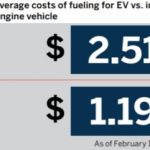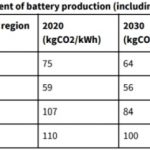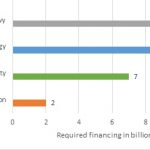Social leasing of EVs could become the breakthrough example of climate action done right, explains William Todts at T&E. And France’s president Macron has promised to do it, aimed at low-income households to counter criticism that even with subsidies EVs are still out of reach for many. Todts quotes T&E analysis that shows that between 2024 and 2030 around 900,000 low-income households could benefit from monthly leasing costs of €70 to … [Read more...]
Analysis: U.S. IRA subsidies put two-thirds of Europe’s battery production pipeline at risk
Major battery manufacturing projects earmarked for Europe are now looking to site themselves in the U.S. to take advantage of its IRA subsidies, according to a new report by T&E. It says over two-thirds of lithium-ion battery production planned for Europe – a pipeline potential of 1.8 TWh - is now at risk of being delayed, scaled down or cancelled. The nations most at risk of losing the business are Germany, Hungary, Spain, Italy, the UK and … [Read more...]
Russia-Ukraine: modelling the consequences for the European electricity market to 2050
Alex Schmitt, Christoph Kellermann, Calvin Triems and Huangluolun Zhou at Energy Brainpool have used their modelling tools to update their predictions of how the European electricity market will develop over the next 30 years, given a target of 99% emission-free generation in 2050. Projections are made on generation (mix and volumes) and price. The big change from their last predictions is the Russia-Ukraine war and Europe’s determination to ramp … [Read more...]
Manifesto: fit-for-purpose flexible grids for the clean electrification of Europe
The integration of new clean generation sources on top of the increase in electrification of industry, e-mobility, and heating and cooling means grid investment must be made a priority. Anything else will leave deployment-ready solutions waiting, slowing down the transition. The backdrop is that over one third of the EU’s grids are already more than 40 years old. Eurelectric has produced a manifesto, “Connecting The Dots”, that estimates … [Read more...]
Giving car manufacturers e-fuel credits will slow the rise of EVs
Transport & Environment (T&E) explains why e-fuel credits should not be included in the EU’s CO2 standards for new cars. If they are, it would give carmakers the option to claim an ICE vehicle as low- or zero-emission. But carmakers have no control over what fuel their customers put in their cars, making the regulation impossible to monitor. That opens the door to double-counting emission reductions with other existing regulations (Fuel … [Read more...]
A marketplace for energy data will enable Europe’s grid expansion
The growth of the decentralisation of energy generation and storage combined with the digitalisation of the metrics of supply and demand is pointing towards a marketplace for energy data, explain Veronika Spurná and Helena Uhde at the EU-China Energy Cooperation Platform. Such a marketplace will monetise the data itself, in recognition of its vital role in enabling the intelligent distribution of energy and investment. There will also be a place … [Read more...]
E-mobility in Germany: a record year but still way off target
In the past few months Germany has seen record levels for electric car registrations. But will this rising trend be enough to meet the government’s target of 10 million electric cars by 2030? To answer the question Naemi Schink and Simon Göss at Energy Brainpool look at the data, proposed new regulations, and funding. Though the number of electric cars has grown by over 360% in the last year there are currently only 240,000 EVs and 200,000 … [Read more...]
The Road Transport Transition: a policy toolkit for electrification
For the electrification of road transport, planning, incentives, the removal of barriers, and the right regulatory framework are all needed. But different regions with different rural and urban lifestyles will each need their own solution. Camille Kadoch at RAP summarises their RAP EV Roadmap for the U.S. which provides a toolkit for assembling your unique solution. It includes targets, funding sources, policy coordination, incentives (including … [Read more...]
Create new laws to help bring Battery manufacturing to Europe
Europe should start leading battery manufacturing instead of leaving it to China, argue Alex Keynes and Cecilia Mattea at Transport & Environment. With laws spreading across the continent to make electric vehicles compulsory for new car purchases, this is a growing and strategic market. But a firm grip on battery manufacture emissions, as well as ethical sourcing and recycling, has to be part of the plan. The authors give a template of what … [Read more...]
Only giving tax breaks to zero-emission company cars will accelerate e-mobility
Subsidies and tax breaks for company cars in Europe cost €32bn a year, a hangover from the days when governments were happy to encourage driving. Chris Bowers at T&E reviews a study that explores the issue in a wide range of European nations and reveals that 96% of company cars are petrol and diesel. As an indicator of the scale of emissions, the study says Europe’s 10 largest leasing companies alone – which include BMW’s Alphabet and … [Read more...]
New U.S. climate bill is unprecedented in “ambition, concrete details, and urgency”
Mark Silberg, Alisa Petersen and Ben Holland at RMI pick out six highlights from a new U.S. climate bill and accompanying report that they describe as unprecedented in “ambition, concrete details, and urgency”. The Democrat-sponsored “Moving Forward Act” passed the House at the start of July and now goes to the Senate. Though regional commitments already get the U.S. halfway to meeting the 1.5°C goal, federal action is needed for the rest. … [Read more...]
Germany’s Corona stimulus package: what’s in it for energy, climate?
€30bn of Germany’s €130bn Corona economic stimulus package is dedicated to the energy sector and the climate. Simon Göss at Energy Brainpool runs through the four main areas of focus. There’s €11bn to fund a reduction in the EEG levy (renewables surcharge) to help electricity consumers. €9bn goes to creating a hydrogen industry for Germany. There’s €7bn to promote e-mobility (tax exemptions, subsidies, co-financing of charging stations and … [Read more...]













